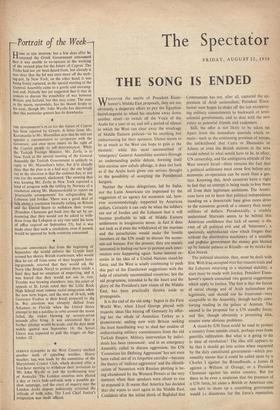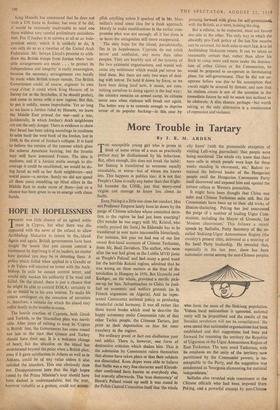THE SONG IS ENDED
WHATEV ER the merits of President Eisen- hower's Middle East proposals, they are too obviously a desperate effort to pay the Egyptian barrel-organist to wheel his machine away down another street—to switch off the Voice of the Arabs for a year or so, and sell a period of silence in which the West can clear away the wreckage of Middle Eastern policies—to be anything but embarrassing for their sponsors. Silence seems to be as much as the West can hope to gain at the moment while" this most unconcerned of 'emergency' General Assemblies saunters through an undemanding public debate, forming itself into curious new cabals offstage, it does not look as if the Arabs have given one serious thought to the possibility of accepting the Presidential bargain.
Neither the Asian delegations, led by India, nor the Latin Americans are impressed by the suggestion of an agency for economic aid, how- ever accommodatingly supported. by American dollars. Certainly it can only be when the soldiers are out of Jordan and the Lebanon that it will become profitable to talk of Middle Eastern settlements in imaginative terms; in fact it does not look as if even the 'withdrawal of the marines and the parachutists would make the hostile members of the UN ready to discuss the econo- mic-aid bureau. For the present, they are mainly interested in finding out how to prevent such inter- vention ever happening again. Some interest re- mains in the idea of a United. Nations stand-by force, and the West is wisely continuing to push' this part of the Eisenhower suggestions with the help of relatively uncommitted‘ countries; but the aid programme, intended to be the heart and the glory of the President's new vision of the Middle East, has been practically thrown aside as ' propaganda.
It is the end of the old song : begun in the First• World War, when Lloyd George. played with majestic ideas like buying off Germany by offer- ing her the whole of Anatolian Turkey as a protectorate; ending now with Britain seeking the 'least humiliating way to shed her residue of embarrassing military commitments from the old Turkish Empire. Military intervention by indivi- duals has been renounced : and in an emergency Assembly called to discuss aggression, the UN 'Committee for Defining Aggression' has not even been called out of its forgotten corridor—because the theoriof 'indirect aggression' and the identifi- cation of Nasserism with Russian plotting is be- ing abandoned by the Western Powers at the very moment When their speakers were about to rise to expound it: It seems that America has decided that she wants to start again in the Middle East. Confident after the initial shock of Baghdad that Communism has not, after all, captured the ex- pression of Arab nationalism, President Eisen- hower now hopes to shake off the last exasperat- ing military commitment's to backward of semi- colonial governments, and to deal with the new rulers as potential friends and customers.
Still, the offer is not likely to be taken up. Apart from the immediate quarrels which re- main—such as the continuing presence of troops, the unlikelihood that Cairo or Damascus or Athens or even the British stations in the area would submit to what would have to be, in 'effect, UN censorship, and the ambiguous attitude of the West toward Israel—there remains the fact that a .political settlement must come first before any economic cooperation can be more than a ges- ture. Knowing this, Arab countries have a right to feel that an attempt is being made to buy them off from their legitimate ambitions. The Ameri- cans have yet to learn that political independence standing on a democratic base gives more drive to the economic growth of a country than many millions of dollars. Paradoxically, a crudely understood Marxism seems to be behind this American confidence that lack of money is the root of all political evil and all 'bitterness'; a speciously sophisticated view which forgets that without the distributive machinery of a sensible and popular government the money gets blotted up by lunatic palaces at Riyadh—or by minks for Kim Novak.
The political situation, then, must be dealt with first. With Iraq occupied over her treason trials and the Lebanon returning to a minimal stability, a start must be made with Jordan. President Eisen- hower's speech contained two general suggestions which apply to Jordan. The first is that the forces of social change and of Arab nationalism are legitimate, and should not be frustrated—very acceptable to the Assembly, though hardly com- forting reading in the palace at Amman. The second is the proposal for a UN standby force; and this, though obviously a promising idea, creates some obvious problems.
A stand-by UN force could be used to protect a country from outside attack, perhaps even from guerrilla infiltration. But what is it going to do in time of revolution? The idea still appears to be that it should go into action when requested by the duly constituted government—which pre- sumably means that it could be called upon by a Charles I against the Roundheads, a James II against a William of Orange, or a President Chamoun against his entire country. But for there to be even a suspicion that the presence of a UN force, let alone a British or American one, can hell to shore up a crumbling government would Le disastrous for the force's reputation. King Hussein has announced that he does not wish a UN force in Jordan; but even if he did, it would be extremely inadvisable to send one there without very careful preliminary considera- tion. For if Jordan is to survive at all as an inde- pendent entity, which it is unlikely to do, It can only do so as a member of the United Arab Federation. Mr. Selwyn Lloyd's promise to with- draw the British troops from Jordan when 'suit- able arrangements are made . . . to protect its independence and integrity' is really meaningless, because the necessary arrangements can hardly be made while British troops remain. The British Government could, of course, engineer its own coup d'Otat; it could whisk King Hussein off to Surrey (or to the Seychelles, if he should prefer), and come to terms with a new regime. But this, to put it mildly, seems improbable. Yet so long as we leave a Jordan ruled by Hussein, we leave the Middle East primed for war—and a war, _ incidentally, in which Jordan's Arab neighbours are not the only danger. There is evidence to show that Israel has been taking soundings in readiness to seize back the west bank of the Jordan, lost in 1948, in the event of Jordan's collapse. It is hard to believe the version of the rumour which gives the scheme American backing, but the Israelis may well have interested France. The idea is madness, and if a Jordan stable enough to dis- courage it could be established, we would be do- ing Israel as well as her Arab neighbours—and world peace—a service. Surely we did not spend all these years stumbling up blind alleys in the Middle East to make more of them—just as a chance has been given to us to emerge with clean hands.































 Previous page
Previous page